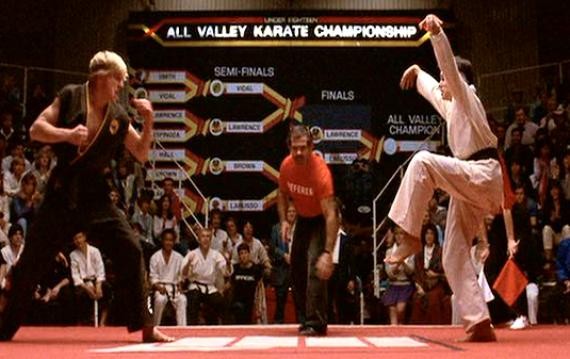The Other James Denn(e)n

So I have to admit, when I first heard that there was a dude named “James Dennen” teaching sample lectures and applying for a position in the Kenyon Drama Department, I laughed at the coincidence. Sure the last name is one letter off, but still it’s pretty close, and I had to imagine that in practice, “Dennin” sounds pretty much the same as “Dennen.” But then, as the facetious congratulatory emails came in they started to wear. I began to think to myself, “just who is this James Dennen guy?” and, “will he carry on the legacy of our phonetically identical name.” Soon a Karate-Kid III style showdown began to seem inevitable. But then after a week or so of stressing out about it I finally brought it up with my playwriting professor and apparently he goes by “Jim,” so I guess we’re all good.
Either way I obviously had reach out to Professor Dennen and see if he had time to schedule an interview. Despite having a baby on the way he still found time to respond to my inane questions with thoughtful answers about his childhood, his background, and his teaching philosophy. So I have to say it seems like the legacy is in good hands.
JD1: So the thing I'm actually most curious about is why you chose Jim?
JD2: I don't know if I did choose it. It happened so early I think it chose me. I know that I "ran away" when I was very young - down to the end of our suburban block I believe - and that one of my principal discontents was that I did not want to be called "Jimmy" any longer. Apparently, this longer moniker came along with some sort of dishonor for a five year old.
JD1: Do you have any personal aversion to the name James?
JD2: Yes, I believe it shows a fundamental flaw in character to keep such a name.
JD1: Lets move on. What were you like as an undergrad?
JD2: Quite concerned with achievement, while equally concerned with being "cool," which presented perpetually challenging decisions with regard to how I might spend my time.
JD1: Favorite Play/Film/Book?
JD2: Hmm. That's a tough question, James. I guess I'll have to say "Goodnight Moon."
JD1: How would you describe your classroom demeanor?
JD2: Animated and enthusiastic, bordering at times on over-controlling, often in pursuit of ideas that the group has generated by surprise, rather than rehearsed intelligence and dreary turntaking.
JD1: What made you want to teach at Kenyon, do you think teaching acting changes in the context of Liberal Arts?
JD2: I love teaching practice and critical thinking to smart motivated undergraduates. I think the concept of Liberal Arts makes this conjunction more likely to take place, especially at a place like Kenyon where the classes are so luxuriously sized and the faculty seems every bit as motivated by discovery as the students.
JD1: What excites you most about living in Gambier?
JD2: Space. Both geographical and metaphorical.
JD1: You seem to have spent a lot of time in cities, are you jazzed for small-town-life?
JD2: I'm 49% concerned that I'll miss the anonymity and 51% thrilled by the possibility of being everywhere and always an intimate part of things. Or maybe it's the reverse, as is sometimes my nature. Certainly Providence, Rhode Island has been a stepping stone, or has taken me part of the way, from places like Chicago, Los Angeles, and San Francisco. I can't go anywhere at all without seeing 10 people I know. I wonder what it will be like to see only people I know.
JD1: At Kenyon most of the productions fall into the genre of "psychological realism" which you talk about in the teaching philosophy on your wordpress as only "one approach to the medium of theater;" and you cite improvisation and jazz studies as teaching specialties. How do these co-curricular interests change or inform the way you direct?
JD2: I firmly believe that improvisation is extracurricular to nothing… least of all to theatre. Even when I direct traditional work, improvisation becomes an approach to material, to collaboration, to experimentation and innovation in general… from beginning to end. I think this is probably true for most artists. I probably just think about it a little more than some because I also teach it and write about it. And now I'm looking back at your question to make sure I've answered it and realizing that you didn't even say "extracurricular." Rather, you said "co-curricular." You see, this is one of the many advantages of looking at life as improvisation: I know that though I could go back and adjust my answer (since we're working on this virtually), I can't actually change the fact that my first answer was what it was - a productive mistake - which is, as always, left just as it was, as you've done with your name. Perhaps I'll be James from now on.
JD1: Do you have any ambitions to explore different media with Kenyon students?
JD2: Yes.
